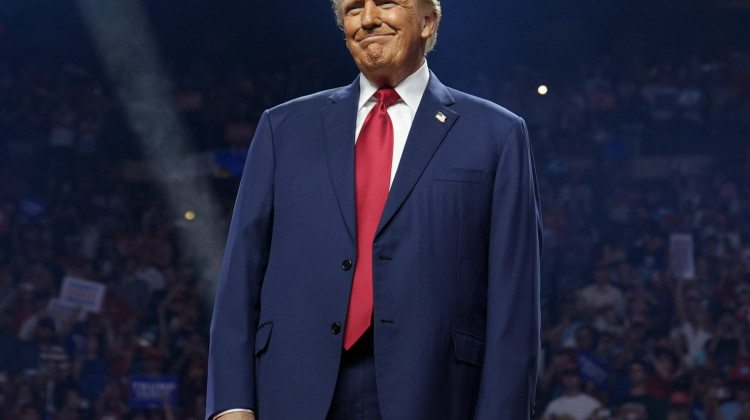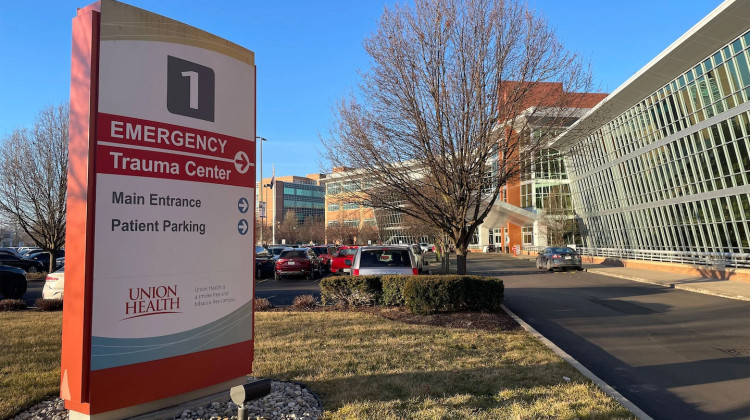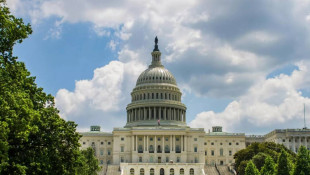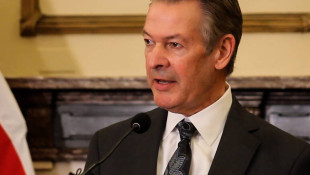
Nonis Spinner, director of eligibility and membership at the Indiana Office of Medicaid Policy and Planning (left) and Brian Arrowood, chief communications officer at the Family and Social Security Administration, presented the state’s plans during the November Medicaid Advisory Committee meeting on November 30, 2022.
Farah Yousry/WFYIThe end of the COVID public health emergency that the federal government declared in 2020 has been postponed several times. Indiana Medicaid officials say it could expire as soon as April 2023. When that happens, hundreds of thousands of Indiana residents on Medicaid could be at risk of losing their coverage.
Here’s why.
What does the end of the public health emergency mean for people on Medicaid?
Pre-pandemic, people on Medicaid have had to go through periodic eligibility checks by the state of Indiana to ensure that they still qualify for the program. Some were also required to contribute monthly premiums –– usually between $1 and $27 –– to what’s called a power account as a requirement to get the highest level of coverage.
All of these steps have been on pause as the federal public health emergency is still in effect. In 2020, the federal government required states to stop disenrolling people and to provide continuous coverage for everyone on Medicaid, in exchange for extra federal dollars.
This has meant that for the past three years, people on Medicaid have been automatically re-enrolled in the program without going through eligibility checks – a process known as redetermination. So, the number of people covered by Medicaid across the U.S grew to 90 million in July 2022 –– a 26 percent increase from February 2020 with Indiana seeing a similar trend.
That could change soon.
In Indiana, up to a quarter of people currently on Medicaid are at risk of losing their coverage when the public health emergency ends, said Nonis Spinner, director of eligibility and membership at the Indiana Office of Medicaid Policy and Planning. But that will only happen after the state completes its process to check people’s eligibility.
Why are public health officials and advocates concerned?
When the public health emergency ends, states will re-start eligibility checks and that means people will have to start filing regular paperwork again or risk losing their coverage. The impending unwinding of Medicaid coverage has left public health officials and patient advocates concerned about potential health insurance coverage gaps for the most vulnerable.
Adam Mueller, the policy director at the legal advocacy group Indiana Justice Project, worries people might be unaware of the changes that will happen after the public health emergency ends and might miss out on important deadlines necessary to prove their eligibility and stay covered. He is most concerned about those with a language barrier and those who first enrolled in Medicaid during the public health emergency.
“For a lot of these folks, this is the first time they've ever had to go through renewal or redetermination. So they may not know about deadlines, how to respond to things in time,” Mueller said.
Some may miss out on state correspondence because their address has changed or they live in a communal setting like a homeless shelter and don’t check their mail regularly, he added.
Just like before the pandemic, Hoosiers whose income has increased, for instance, will be found ineligible for Medicaid and they will ultimately be disenrolled. Advocates worry that these people might not be aware that they may qualify for other subsidized government insurance through the Affordable Care Act marketplace at healthcare.gov.
Mark Fairchild of Covering Kids and Families Indiana said he wants the state to ensure a “warm handoff” for this group so they don’t go uninsured when there are other options available for them.
Fairchild encourages people to contact his group, or others like it, to connect with an insurance navigator who can walk people through their options and identify a health insurance plan that meets their needs.
Many patient advocates are particularly concerned that the end of the public health emergency could bring a double blow to Medicaid enrollees in Indiana specifically. That’s because, in addition to the paperwork and forms some may need to fill out, Hoosiers also face other administrative hurdles represented in monthly payments to what’s known as power accounts. Many people may miss out on these payments and be deemed ineligible for Medicaid because of it.
“To be completely honest, [the power accounts] have been a failed experiment from the start,” said Tracey Hutchings-Goetz of the advocacy group Hoosier Action. “If this stays in place after the [public health emergency] ends, it's going to waste even more public dollars” because people who get kicked off Medicaid will reapply. Those people are likely to experience coverage gaps.
The rationale behind these power accounts has been that patients contributing any financial amount will incentivize them to use health care more responsibly by, for example, discouraging unnecessary emergency department visits and adopting more preventive medicine measures.
What steps can you take to prevent coverage gaps?
- If you’re a Medicaid enrollee, make sure to update your contact information with the state. If your income or asset information has changed, update that as well.
- To update your information, go to FSSABenefits.IN.gov then scroll down to the blue “Manage your benefits” section and click on “Sign in to my account” if you already have an account or click on “Create account” if you don’t have an account. You can call 800-403-0864 if you need help.
- You can also access resources that organizations like Covering Kids and Families Indiana make available, such as information portals and health insurance navigators who can provide assistance free of charge.
- Keep an eye out for updates about the end of the federal public health emergency.
- If you’re a health care or insurance provider, talk to your clients and patients about what the end of the public health emergency will mean for their coverage. You can also print or request posters and postcards from the IndianaMedicaid.com website or use social media assets to spread the word.
- Scammers are most active when insurance is in the news and during open enrollment periods. So, it’s important to be vigilant. If you get a call from someone claiming to be from the government trying to sell you a health insurance plan, know this is probably a scam, according to AARP, as government representatives will never try to sell you insurance.
How is Indiana preparing?

The U.S. Center for Medicare and Medicaid Services requires states to come up with plans for how they will unwind Medicaid coverage when the public health emergency ends and to outline their timeframe and how they’ll prioritize renewals.
It has been a challenge for state officials across the country to solidify plans because the end date of the public health emergency has been changing for a while – making it difficult to develop Medicaid budgets or prepare resources like staffing for instance.
“That first month when redeterminations come through, it's… going to be higher than we've ever seen in the history of the state of Indiana,” said Brian Arrowood, chief communications officer of the Indiana FSSA.
These concerns are shared across the country. The National Association for Medicaid Directors has sent a letter to the federal government saying that the uncertainty around when the public health emergency will end is “no longer tenable.”
The NAMD is a bipartisan non-profit organization that represents leaders of state Medicaid agencies across the U.S. The letter said that the uncertainty around the end date “creates immense variability in budget scenarios and erodes Medicaid leaders’ credibility with their governors and legislatures. It also inhibits the ability for state and county eligibility entities to know when to deploy staffing resources.”
During the latest Medicaid Advisory Committee meeting, Spinner of the Office of Medicaid Policy and Planning laid out Indiana’s plans aimed at mitigating insurance coverage gaps:
Communication and reminders
- The state will send postcards reminding people to update their contact information and to watch for and respond to mail from FSSA. They will also use phone call and text to reach members,
- The state will work with health plans to get the message out to their members.
- The website IndianaMedicaid.com has a portal where anyone can access a toolkit and information on what the “return to normal” will look like and how it would impact Indiana residents on Medicaid. The website also offers social media assets that can be shared online, as well as flyers, posters and postcards with crucial information that people can download and print in bulk to share with their communities.
- The state will send an explanation reminder letter 60 days before they mail out paperwork for eligibility checks. This reminder letter will include information on finding an insurance navigator in Indiana and how to apply on the ACA marketplace or healthcare.gov if the person is found ineligible for Medicaid.
- Then the state will send redetermination mailers 45 days before the redetermination due date. If a person is found ineligible after the redetermination process, they will receive a final advance warning that they will lose their coverage and will be sent information on their rights to appeal and how to do so.
- If someone doesn't reply back to the state with the necessary information needed for redetermination, they will be given a chance to come back into compliance within 90 days so that they can regain eligibility without having to reapply.
Waivers and grace periods
- The state no longer uses “Medicaid lockouts,” which used to require people to wait six months before reapplying if they were denied coverage for any reason. If anyone loses coverage due to an error, they can immediately reapply and obtain coverage if they’re eligible.
- The state received a waiver from CMS to access and use information like mailing addresses that people provide to specific entities like their health plan.
- There will be a grace period for those who miss out on cost-sharing requirements –– like the power account monthly premiums. The person will receive notice from FSSA at least one month before the state would resume the cost-sharing requirement. The notice will explain next steps and deadlines.
- Cost sharing will not resume until at least three months after the public health emergency ends.
- Those who are found to be over the income limit for Medicaid will have their information transferred to the federal marketplace, healthcare.gov and be given a special enrollment period to apply for coverage.
- Normally, states can’t forward the information of people who are found ineligible because they failed to verify their income or other aspects of eligibility to the federal marketplace. But CMS has made a special provision that would give a special enrollment period throughout the whole year without having to wait for November or for a qualifying event to happen for people to apply for coverage.
This story comes from a reporting collaboration that includes the Indianapolis Recorder and Side Effects Public Media — a public health news initiative based at WFYI. Contact Farah at fyousry@wfyi.org. Follow on Twitter: @Farah_Yousrym.
 DONATE
DONATE





 View More Articles
View More Articles




 Support WFYI. We can't do it without you.
Support WFYI. We can't do it without you.